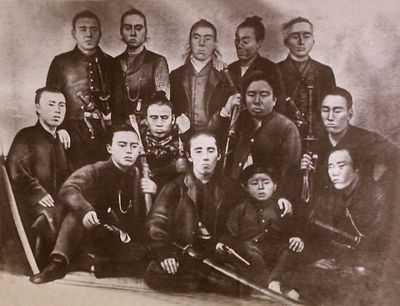Tani Tateki
| Tani Tateki | |
|---|---|
 General Tani Tateki | |
| Nickname(s) | Tani Kanjō |
| Born |
March 18, 1837 Kochi, Tosa province, Japan |
| Died | May 13, 1911 (aged 74) |
| Allegiance | Empire of Japan |
| Service/branch |
|
| Rank | Lieutenant General |
| Battles/wars |
Boshin War Satsuma Rebellion Taiwan Expedition of 1874 |
| Other work | Minister of Agriculture & Commerce |
Viscount Tani Tateki (谷 干城, 18 March 1837 – 13 May 1911) was a statesman and lieutenant general in the Imperial Japanese Army in Meiji period Japan. He was also known as Tani Kanjō.
Biography
Early life
Tani was born in Kōchi, Tosa Province (present-day Kōchi Prefecture) as the 4th son of a local samurai. He was sent to Edo in 1857, and became active in the Sonnō jōi movement. In 1866, he was ordered by his domain to go to Nagasaki, where he met Gotō Shōjirō and Sakamoto Ryōma, who convinced him to meet with Saigō Takamori in Edo the following year, and to work for an alliance between Tosa and Satsuma.
Military career

Tani fought in the Boshin War to overthrow the Tokugawa shogunate, leading imperial forces in the north Kantō, and Aizu-Wakamatsu campaigns.
After the Meiji restoration, Tani became a general in the Imperial Japanese Army, and helped suppress a number of samurai uprisings in Kyūshū, including the Saga Rebellion and Shimpūren Rebellion. He withstood a siege of 52 days in Kumamoto castle against Saigō Takamori during the Satsuma Rebellion. Tani also took part in the Taiwan Expedition of 1874.
Afterwards, Tani was commandant of the Imperial Japanese Army Academy before retiring from active service in 1881.
Meiji bureaucrat
Tani was one of the founders of the conservative political party, Chūseitō, in 1881. He also became president of the Gakushūin Peers’ School in 1884.
In 1885, Tani joined the first Itō Hirobumi cabinet as the first Minister of Agriculture & Commerce, however, he soon resigned over dissatisfaction with what he perceived to be the weak and vacillating foreign policy of Inoue Kaoru, especially with regards to the revision of the unequal treaties.
In 1890, Tani was ennobled with the rank of shishaku (viscount) in the kazoku peerage system, and became a member of the House of Peers.
Political views
Tani's political views, as they became known in the 1880s and the 1890s were a mix of conservatism, liberalism and staunch anti-Imperialism.
Tani was one of the leaders of a group called the "conservative opposition", an alliance of retired generals, politicians and peers who were critical both of the Meiji government and the movement for popular rights. Leading members in the conservative opposition, including Tani, believed that the "nation" is composed of a mystical union between Emperor and people, and therefore the government should rest neither with the oligarchs nor with the political parties. In his constitutional proposals, Tani had suggested to raise the Emperor to a status of an arbitrator between three independent branches of government - the executive, the judicial and the legislative, balanced by a set of checks and balances but dependent on the discretion of the Imperial Throne. Though critical as for the "selfishness" of the political parties, he was a supporter of the freedoms of speech and assembly.
Tani's views on foreign policy were a mix of anti-Imperialism and belief in Japan's national essence (Kokutai). As young general, during the Taiwan Expedition of 1874, he advocated occupying southern China,[1] but in the 1880s he had reemerged as a military oppositionist. He resisted the reforms of Yamagata Aritomo in the army, and believed that Japanese army had to be kept as a small force for defensive purposes alone. Along with the generals Miura Goro, Torio Koyata and Soga Sukenori he was a co-founder of the "four generals group" who resisted the "Prussian" military reforms of the 1800s.[2] Even after the Sino-Japanese War of 1884-5, when all of Tani's friends to the conservative opposition became enthusiastic about territorial expansion, he was staunchly against any advance to the continent. On the other hand, he was set against any concession to the foreigners in the struggle against the unequal treaties and believed Japan must refrain from alliances with great powers in order to uphold its own unique culture, tradition and national essence. Tani's unique position as a rare anti-Imperialist thinker in the Japanese military establishment, earned him a description by Mutsu Munemitsu, Japan's foreign minister, as a "lone flower in a field of grass."[3]
References
- ↑ Tani Kanjō, Tani Kanjō Ikō, Nihon Shiseki Kyōkai, ed. (Tokyo: Tokyo Daigaku Shuppan Kai, 1975-6), vol 2., p.71
- ↑ Shin'ichi Kitaoka, "The Army as a Bureaucracy: Japanese Militarism Revisited," The Journal of Military History 57:5 (October, 1993), 71-2
- ↑ The Conservative Opposition in Japanese Politics: 1877-1894 (PhD thesis: University of Washington, 1955), 1-50; Hata Ikuhiko, "Binhi Satsugai Jiken no saikōsatsu", Seikei Kenkyū 43:2, pp. 76-7
Books
- Keene, Donald (2005). Emperor Of Japan: Meiji And His World, 1852-1912. Tokyo: Columbia University Press. ISBN 978-0-231-12341-9.
- Hillsborough, Romulus (2005). Shinsengumi: The Shogun's Last Samurai Corps. Tokyo: Tuttle Publishing. ISBN 978-0-8048-3627-2.
External links
- National Diet Library. "Tani Takeki". Portraits of Modern Historical Figures.
| Political offices | ||
|---|---|---|
| Preceded by new creation |
Minister of Agriculture & Commerce Dec 1885 - Jul 1887 |
Succeeded by Hijikata Hisamoto |
| Educational offices | ||
| Preceded by Tachibana Taneyuki |
President, Gakushūin Peers School 1885-1887 |
Succeeded by Ōtori Keisuke |